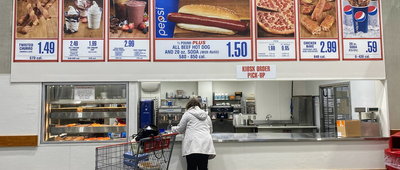We feel a bit hypocritical telling our readers not to eat fast food, but the fact is that most of it is quite harmful. That’s because fast food is often ultra-processed, deep-fried, high in sodium, sweet, and packed with refined grains. In other words, burgers, fried chicken sandwiches, and french fries contain most (if not all) of the ingredients experts warn us about with little nutritional benefit.
That said, eating out at fast-food joints isn’t always a terrible idea. In an interview with the Cleveland Clinic, Registered Dietician Nutritionist Nancy Geib says that eating the occasional fast-food meal won’t ruin your life, especially if you pay attention to the nutrition facts. “If you do your research and you look for the best options, you can definitely still go to a fast-food restaurant if that’s all you have,” she explains.
Related: 15 Healthy Fast Food Menu Items at McDonald's, Wendy's, and Beyond



















